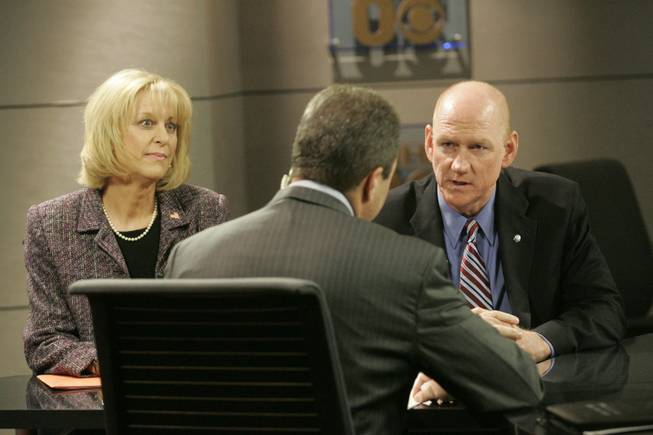
Republican Assemblywoman Valerie Weber, left, and Democratic Las Vegas City Councilman Larry Brown talk to moderator Jon Ralston during a taping of “Face to Face With Jon Ralston” on Friday.
Tuesday, Sept. 30, 2008 | 2 a.m.
Sun Topics
The seven-member Clark County Commission is the most important elected local government in the state, largely because the economic engine of the state, the Strip, sits in the heart of its jurisdiction.
Four seats are up for election in November. Two are held by incumbents who are expected to be reelected. In the other two, the incumbents are not seeking reelection, leaving those seats up for grabs.
To help voters get past the barrage of campaign mailers and door-hangers, Sun columnist Jon Ralston moderated two half-hour debates between the leading candidates during a special edition of “Face to Face With Jon Ralston” on Friday. The following is one of two stories that recap those debates.
• • •
Amid a worsening national economic crisis, candidates for Clark County Commission District C have turned their race into a referendum on fiscal responsibility.
Republican Assemblywoman Valerie Weber attacked Democratic Las Vegas City Councilman Larry Brown for what she has called his “misguided priorities.” Chief among them, she said, was his heavy campaign spending on political consultants.
According to campaign finance reports, Brown raised $437,800 in the first seven months of the year and spent $453,900, with about $266,000 of that going to consultants. Weber called the expenditures “inappropriate,” saying the spending called into question how Brown would exercise his fiduciary responsibilities.
For her part, Weber raised $151,000 and spent $76,400, with nearly half of that going to political consulting.
“He has spent half a million dollars, primarily employing lobbyists on his campaign,” Weber said. “People will be outraged to know in this economy that that’s happened.”
Brown made no apologies, noting his council post, his part-time job with the Las Vegas 51s baseball team and his family obligations. “This is a comprehensive campaign,” he said. “I need some professional help, and I’ve put together a great team.”
Brown said he would honor his initial pledge to spend less than 10 percent of his total contributions on campaign administration.
Weber has also attacked Brown for his role in the Tennis Channel Open tournament, staged since 2006 at the Darling Tennis Center in his ward.
In 2005, the City Council signed a two-year agreement obligating the city pay $300,000 each year toward the Tennis Channel’s expenses. In addition, the contract required the city to make improvements to utilities, parking and communications infrastructure at the tennis center. All told, over three years the city spent $2.4 million, she said.
Brown said much of the cost went to improving the condition of the tennis courts. The city, he said, has spent nearly $2 million on outside attorneys “to fight for what may end up being a $10 million to $12 million fix.” Nevertheless, he said, the city’s investment in the tournament was worth it, attracting a range of competitions. “If we invested $11 million for that facility, the return over the years will be double or triple,” Brown said.
As for past money-related votes, debate moderator Jon Ralston asked Weber about her opposition to the Legislature’s 2003 tax increase, which went mostly to pay for infrastructure related to education. Weber said at the time that savings should be found in cutting government programs, but she did not provide a list of options. Asked by Ralston what programs she would have cut, Weber dodged. “We’re looking ahead now,” she said. “That vote was five years ago ... We need to focus on the future.”
Ralston then asked Brown about the council’s controversial approval of a zoning decision sought by developer Billy Walters in 2005. Walters asked the council to remove a zoning restriction on a golf course he owned so he could build a housing development on the land. The council concurred and, as a result, the land value skyrocketed by as much as $28 million. A Metro Police investigation subsequently found changes had been made to a key engineering report, casting the proposal in a more favorable light. The council later rescinded its vote.
Brown told Ralston on Friday the council took action based on staff recommendations, and that after learning of the changes to the report, “it was fortunate we were able to rescind that vote.”
Brown said the city’s low tax rate and its high bond rating — the highest in its history — showed that he and the council have been good stewards of taxpayer dollars.

Join the Discussion:
Check this out for a full explanation of our conversion to the LiveFyre commenting system and instructions on how to sign up for an account.
Full comments policy